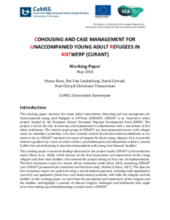Introduction
This working paper concerns the social policy intervention Cohousing and case management for Unaccompanied young adult Refugees in ANTwerp (CURANT). CURANT is an ‘innovative urban project’ funded by the European Union’s European Regional Development Fund (ERDF). The project is led by the City of Antwerp and implemented in collaboration with a consortium of five other institutions. The central target group of CURANT are unaccompanied minors with refugee status or subsidiary protection, who have recently turned 18 and thus entered adulthood, or are about to do so. CURANT combines two types of support for these young refugees: first, it provides intensive guidance by a team of social workers, psychotherapists and educational workers; second, it offers low-priced housing in shared accommodation with young local flatmate ‘buddies’.
This working paper is based on findings discussed in the project report CURANT: a first evaluation report (Ravn et al., 2018), which focuses on the first impressions and experiences of the young refugees and their local buddies, who entered the project during its first year of implementation. This first evaluation is part of a theory-driven evaluation study (Chen 2015) examining CURANT (see CURANT: groundwork for evaluation and literature study, Mahieu & Ravn, 2017). The data for this evaluation report was gathered using a mixed-method approach, including both quantitative (surveys) and qualitative (interviews and observations) methods, with both the refugees and the buddies. In this working paper, we start from the perceptions and experiences of the refugees and the buddies, and highlight a number of relevant insights, challenges and bottlenecks that might arise when setting up and implementing a project such as CURANT.

